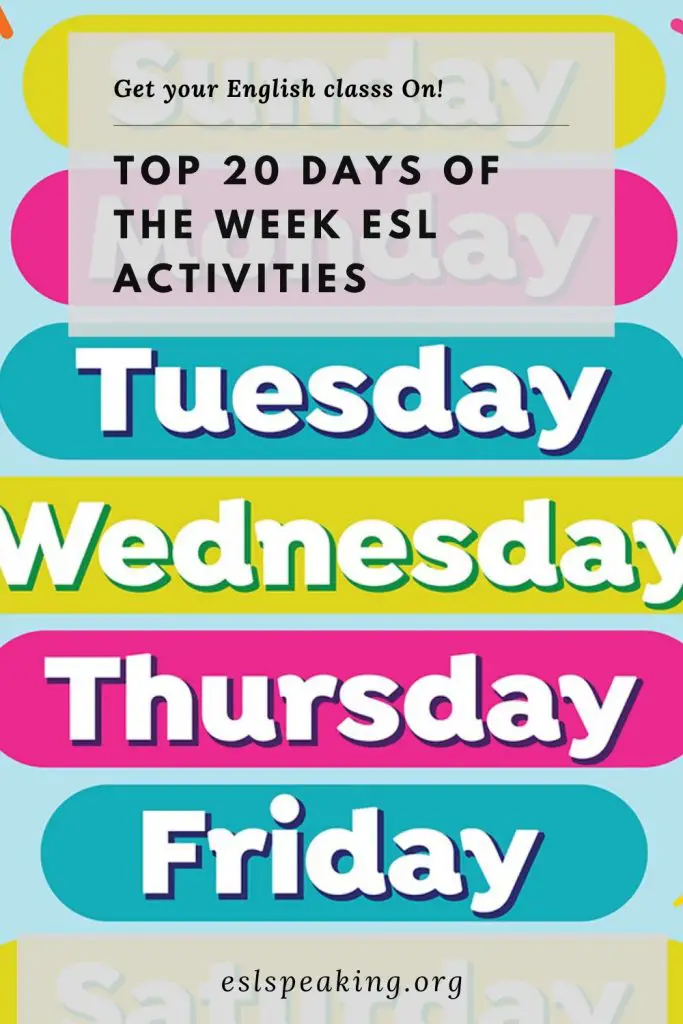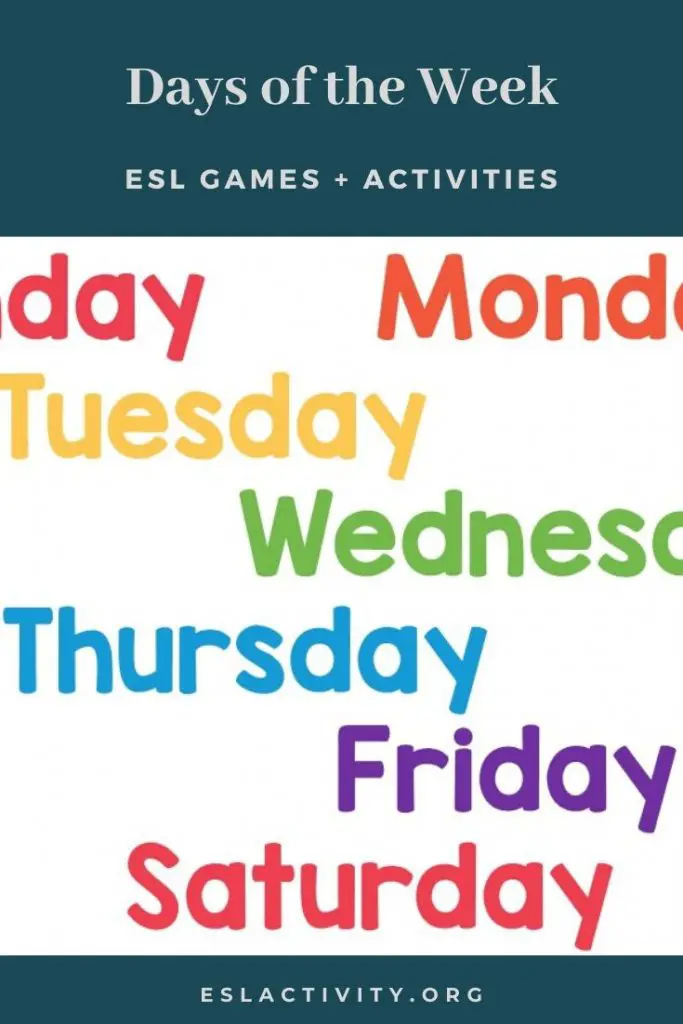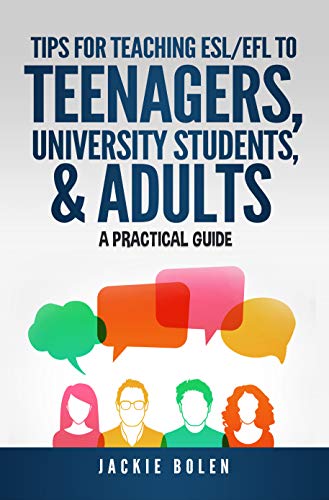Day of the week is a common unit found in many beginner ESL textbooks. If you’re looking for some fresh, new ideas to keep things interesting, then you’re in the right place. You can find lots of days of the week games and activities, along with lesson plans, worksheets, online practice and more.

Days of the Week games and activities for ESL
Days of the Week ESL Activities and Games
Let’s get into the best ESL games and activities to teach students about days and weekly schedules.
#1: Telephone ESL Speaking and Listening Game
I’ve sure you’ve played telephone when you were a kid. The way it works is that students pass a sentence secretly from person to person down the line. Then, at the end, the last student compares what they heard with the original one. The results are usually hilarious.
In this case, use something like the following for your starter sentences:
- On Monday, I usually play soccer but on Friday I go swimming.
- On Sundays, I like to make a big breakfast, go hiking and then come home and relax.
#2: Word Challenge Spelling Game
If you’re teaching the days of the week to absolute beginners, try out this fun spelling activity. Divide the class into two teams and then have one member from each team come up to the whiteboard. Say a day (Thursday) and the first student to spell it correctly gets a point for their team.
Of course, you can use this activity for any sort of vocabulary set. Check it out here: ESL Spelling Challenge.
#3: Dictogloss Days of the Week Activity
This is an ESL activity that’s heavy on the listening and can be adapted to just about any kind of topic or vocabulary. In this case, you’ll want to find a reading passage that has a lot of the days of the week in it. Perhaps someone talking about their weekly schedule (or write it yourself).
Then, put students into pairs and have them take notes as you read out the passage more quickly than you normally would. Then, they work together to try to recreate what they heard. After that, read it again at a fast pace and students do the same. Finally, they compare their version with the original. Learn more about it here:
It’s certainly one of my favourite days of the week ESL activities so be sure to give it a try.
#4: Day of the Week Songs and Chants
One of the best ways for kids to learn new vocabulary is with songs and chants. If you’re not musical, not to worry! There are plenty of games and activities to consider using in your classes. Have a look on YouTube and you’re sure to find something that’ll work in just a minute or two.
#5: ESL Survey
A nice way to get students talking about their weekly schedules is to use a survey. Just ask my students and they’ll tell you how much I love this activity! It’s ideal because it covers a range of skills and also gets students up and out of their seats, moving around the classroom and talking to their classmates.
In this case, some of the yes/no questions to include on your survey might be the following:
- Do you like to sleep in on weekends?
- Are you an early riser?
- Do you eat something special for breakfast on Saturday or Sunday?
- Do you ever stay up too late on a weeknight?
- Etc.
Do you want to try out this kind of activity with your English learners? Find out everything you need to know right here:
#6: Dictation Practice
I know that dictation has fallen out of favour a little bit these days with an emphasis on the communicative approach. But, when students are learning new words or grammatical constructions, it can certainly have some value.
For beginners, you may want to simply say the word (Tuesday) and have students write it in their notebooks as a way to practice spelling.
More advanced learners can dictate an entire sentence (On Monday and Tuesday, I have to get up early to go to school).
- Amazon Kindle Edition
- Bolen, Jackie (Author)
- English (Publication Language)
- 57 Pages - 10/26/2015 (Publication Date)
#7: Me Too!
A nice way to get students speaking and listening is to play Me Too! The way it works is that each student says a sentence about their weekly schedule. The key is to say something that they think some people will agree with, but not everyone. For example:
- I usually play soccer after school on Fridays.
- On Sunday, my Dad makes pancakes or French toast.
Then, if someone else has the same thing, they say, “Me Too!” Find out all the details here:
#8: Word Association Days of the Week Activity
A nice warmer activity is Word Association. In this case, you may want divide it up into two sections: weekdays and weekends. Then, students can contribute some words that come to mind when you think of those days. Check it out here:
#9: Find Someone Who
This is an ESL icebreaker kind of Bingo activity, but it can be very easily adapted to weekly schedules. Fill up the board with statements like the following.
Find Someone Who…
- likes to sleep in on Saturday
- stays up late on Friday night
- cooks for the week on Sunday night
- doesn’t get enough sleep on weekdays
- has no free time from Monday to Friday
- Etc.
Learn more about this ESL activity here: Find Someone Who Bingo.
#10: Day of the Week ESL Speaking Lesson
It’s super easy to plan an ESL speaking lesson about almost anything, including days of the week. Check out this video for the simple steps that you can follow:
#11: Running Dictation
This is one of my favourite 4-skills ESL games that the students love to do. Plus, it’s possible to use it for any sort of topic, including daily or weekly schedules.
You’ll need to find (or write) a conversation between two people talking about what they do on various days of the week. Then, students have to work together to dictate the conversation and then put it into the correct order. Try it out here:
This is one of the best days of the week ESL games so be sure to give it a try with your students.
#12: Concentration Memory Game
This is a fun memory game that can help your students remember new vocab. In this case, you’ll want to make cards with clues and then a day. For example:
Monday = the day after Sunday
Wednesday = the day before Thursday
Sunday = the most common day people go to Church
Etc.
Then, students put the cards face down and play a matching game in small groups. Learn how to do it here:
- Amazon Kindle Edition
- Bolen, Jackie (Author)
- English (Publication Language)
- 110 Pages - 06/05/2020 (Publication Date)
#13: Chain Spelling Activity
This is a simple way to review how to spell words in English. The students stand up and you say a word (Wednesday). Students have to spell it out, letter by letter. If someone misses a letter, they sit down and are out of the game. The last person left standing is the winner.
#14: Conversation Starters and Free Talking
If you tell your students to talk about their weekly schedules with a partner, you may be met with blank silence. So if you want to do free-talking, a better option is to encourage free conversation, but also give students some conversation starters they can fall back on if they get stuck. For example:
- What do your weekends look like?
- Do you live for the weekend?
- What time do you usually get up?
- What’s your morning routine like?
- Amazon Kindle Edition
- Bolen, Jackie (Author)
- English (Publication Language)
- 122 Pages - 02/23/2020 (Publication Date)
#15: 3 Things Writing Activity
This is a super simple, no-prep writing activity. The way it works is that a student thinks of three things and another student has to make a story (true or fictitious) using those three words. In this case, I’d restrict it to days and schedule kinds of words.
See all the details here:
#16: Dialogue Substitution
It’s often the case that new vocabulary is introduced in ESL textbooks through a dialogue of some kind. However, maybe your students are like mine and if you ask them to read it, they just blow through it super quickly and don’t really pay attention to what they’re reading. Of course, it’s not their fault! It’s just that they have no real reason to read closely.
The better way is to remove some key words (days or activities) which turn it from a straight-up reading activity to one that’s focused on meaning as well. Try it out for yourself and I’m sure you’ll notice a big difference.
#17: Days of the Week Wheel
Here’s a fun idea to use with your kindergarten or pre-school kids as a nice routine to start the class off with. Make a wheel out of paper with the days on it. Then, students have to turn the wheel to the correct day.
#18: Information Gap Activities
I love to use information gap activities with my TEFL students. In this case, you’d want to find out related to schedules and give each student half the information. Then, they have to work together to recreate the entire weekly schedule by talking to each other and asking questions.
Sounds like something you want to try? You can check it out here:
ESL Information Gap Activities.
#19: Listening for a Specific Thing
Helping students with listening can sometimes be quite overwhelming but it can be helpful if we focus on only 1 or 2 specific things. For example, in a listening passage about a weekly schedule, maybe what the person is doing on Tuesday night and Saturday morning. Then, on the second listening, students can attempt to add more to the schedule. Start small and then go for more details on the second and third time through.
#20: ESL Review Activities
When you’re introducing any new vocabulary to your students, review is key if you want your students to retain what you’ve taught them. Here are some of the ideas for doing that:
ESL Review Activities and Games

Days of the week games
#21: Closest in Meaning
This is a simple review activity that can be used for just about any level. Write down one target sentence on the whiteboard or a PowerPoint slide. Then, write down 2 or 3 more sentences, one of which is very similar in meaning to the target. Students have to choose which one matches most closely. For example:
Target Sentence
- I love to play soccer on weekends.
Other Sentences
- I enjoy playing soccer at night with friends.
- My team usually plays soccer on Saturday or Sunday.
- I have soccer practice on Tuesday night.
The best fit is obviously the middle sentence. Find out more about this simple activity here:
#22: Daily Routine ESL Activities
Daily routines and days of the week are very closely related to each other. Check out some of the top ideas for ESL activities and games for routines here:
#23: Try out the Test-Teach-Test Approach
Unless students are absolute beginners, they may already know a lot about the days of the week. Why not test them first to find out what they don’t know so you can focus your lesson on that? Have a look here to find out more:
#24: Man/Woman on the Street Interview
A common activity in ESL textbooks for this unit is to get students to describe their activities for a certain day of the week, usually one day that they go to school or work and then one day on the weekend.
To spice things up a bit, I like to do this man/woman on the street interview activity. It turns something old (interviewing a partner) and makes it into something novel and fun. Find out more about it here:
Man/Woman on the Street Interview Activity.
#25: Postcards ESL Writing Activity
If you can get your hands on some old postcards, try out this fun writing activity. Students have to pretend that they are on vacation somewhere and are writing a postcard to a friend or family member.
In order to practice the days of the week, have students describe what they did each day for a certain number of days. Monday/Tuesday/Wednesday for example. Try it out:
#26: Days of the Week Relay Race
Divide the class into teams and set up a relay race. Place flashcards with the days of the week at one end of the room and an empty box at the other end for each team. The first player from each team runs to the flashcards, picks up the card with a day of the week, and places it in their team’s box. The relay continues until all the days of the week are sorted correctly. The team that finishes first wins.
#27: Days of the Week Board Game
Create a board game where students move their game pieces along a path while practicing the days of the week. Each square on the board can have a task or question related to the days of the week, such as “Name a day that comes after Monday” or “Spell the word ‘Wednesday’ backward.”
#28: Days of the Week Jigsaw Puzzle
Create a jigsaw puzzle with a picture or illustration that represents a specific day of the week. Cut the puzzle into pieces and distribute them to the students. They have to work together to assemble the puzzle and identify the day of the week depicted in the picture.
Days of the Week Worksheets
There are lots of excellent worksheets for teaching days of the week to English learners. Here are some of the best options:
ESL Lesson Plans for Days of the Week
If you’re an English teacher, I’m sure that you like to save time when doing lesson planning, right? The ultimate is to just find a lesson plan that’s already done! Some other teacher has already done the hard work and all you have to do it print it off and go teach. Here are some of the best days of the week lesson plans:
Online Practice for Days of the Week
If you want to give your students some additional opportunities to practice, consider recommending the following online games to them:
Did you like these Days of the Week Activities?
- Amazon Kindle Edition
- Smith, Jennifer Booker (Author)
- English (Publication Language)
- 134 Pages - 03/31/2016 (Publication Date)
Yes? Thought so. Then you’re going to love this book over on Amazon: 101 ESL Activities for Kids. The key to better English classes for children is a wide variety of engaging, interactive and student-centred games and activities and this book will help you get there in style.
You can get the book in both digital and print formats. Keep a copy on the bookshelf in your office to use as a handy reference guide. Or, consider taking the e-version with you on your phone, tablet or laptop to your favourite coffee shop for some lesson planning on the go.
Yes, it really is that easy to have better English classes for kids. Head over to Amazon to pick up a copy of the book today but if you want to get yourself a serious dose of ESL teaching awesome in your life:
FAQs
There are a number of common questions that people have about teaching this topic. Here are the answers to some of the most popular ones.
How can I practice the days of the week with English learners?
You can practice by asking questions like “What day comes after Monday?” or “What day comes before Friday?” You can also engage in activities such as creating schedules, discussing favorite days, or playing games like “Day of the Week Bingo.”
How can I help English learners remember the spelling of the days of the week?
Break down the spelling of each day, emphasize the unique letter patterns or sounds, and practice writing and spelling the days of the week through repetition and interactive exercises.
How can I incorporate the days of the week into daily activities in the classroom?
Use the days of the week during attendance or morning routines. Plan specific activities or themes for each day of the week, and encourage students to talk about their plans for different days.
What are some interactive games or activities for teaching the days of the week?
Play “Day of the Week Memory Match” with cards, have students sort days into the correct order, do “Day of the Week Charades,” or create a “Days of the Week Song” with gestures.
How can I teach the concept of weekdays and weekends?
Explain that weekdays are Monday to Friday when most people work or go to school, and weekends are Saturday and Sunday when people have free time. Discuss different activities typically done on weekdays and weekends.
How can I teach the concept of yesterday, today, and tomorrow using the days of the week?
Use a calendar or visual aids to demonstrate the relationship between the days. Ask questions like “What day is today?” “What day was yesterday?” and “What day will be tomorrow?”
Are there any cultural aspects related to the days of the week that I should consider when teaching English learners?
Be aware that cultural conventions or traditions might differ across countries or communities. Encourage students to share their experiences and how days of the week are celebrated or observed in their culture.
Have your Say about Day of the Week ESL
Do you have any tips or tricks for teaching days of the week to English learners? Leave a comment below and let us know your thoughts. We’d love to hear from you.
Also be sure to give this article a share on Facebook, Pinterest, or Twitter. It’ll help other busy English teachers, like yourself find this useful resource.
Last update on 2022-07-17 / Affiliate links / Images from Amazon Product Advertising API









